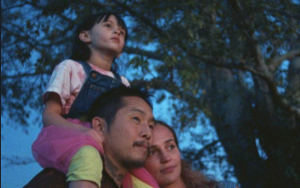BLUE BAYOU: 3 STARS. “story that is sincere but heavy-handed.”
 “Blue Bayou,” a new immigration drama starring Justin Chon and Alicia Vikander, tells a fictional, but all-too-true, story that is sincere but heavy-handed.
“Blue Bayou,” a new immigration drama starring Justin Chon and Alicia Vikander, tells a fictional, but all-too-true, story that is sincere but heavy-handed.
Written, directed and starring Chon, the story takes place in the Louisiana bayou. Chon plays the Korean-born Antonio LeBlanc, adopted by an American family when he was three. Now married to Kathy (Vikander) he’s raising step-daughter Jessie (Sydney Kowalske) with another child on the way.
A loping Cajun twang disguises the anxiety he feels with a new baby coming but not enough money coming in. His two felonies make it tough to find extra work, and his job as a tattoo artist does not cover the bills. Still, the family is happy, even if Jessie is concerned Antonio, the self-proclaimed “fun” parent, won’t spend time with her when the new baby arrives.
A little spat between Kathy and Antonio in a grocery escalates when Ace, a cop and her ex-husband, and his violent partner (Emory Cohen) get involved. Antonio is arrested. When Kathy attempts to pay his bail, she’s told, matter-of-factly, “He’s not here anymore. ICE took him.”
Seems his adoptive parents didn’t follow the proper procedures to make him a citizen, and now, after thirty years in America he may have to return to a country he doesn’t remember.
“I understand your frustration,” says the lawyer (Vondie Curtis-Hall) the couple hire but can’t afford. “Depart voluntarily,” he continues, “and have a chance to get back in. You can fight, but if you lose, you can never come back.”
“I’m not leaving my family,” Antonio replies.
“Blue Bayou” has much going for it. Chon has a poetic eye for visuals and frames the hot button story nicely. There are enough details about the family to make us care about them and Antonio’s backstory adds some mystery to the proceedings. The chemistry between the core group—Antonio, Kathy and Jessie—feels genuine—Kowalske is a real find—and, as the immigration situation spins out of control, we’re along for the ride. But as the story gets heavier, so does the story-telling. Like leaden.
Chon’s characters are so compelling and much of the tale so heartfelt, that it’s a disappointment when the movie turns to melodrama in its final third. Nuance goes out the window and the quiet naturalism of the first half disappears. Add to that a villain in the form of Cohen’s bad cop character who seems to have wandered in from a British pantomime and you’re left with a case of the let-downs.
“Blue Bayou” details a very important, and for many people, very personal story, but falls victim to ham-fisted storytelling.
